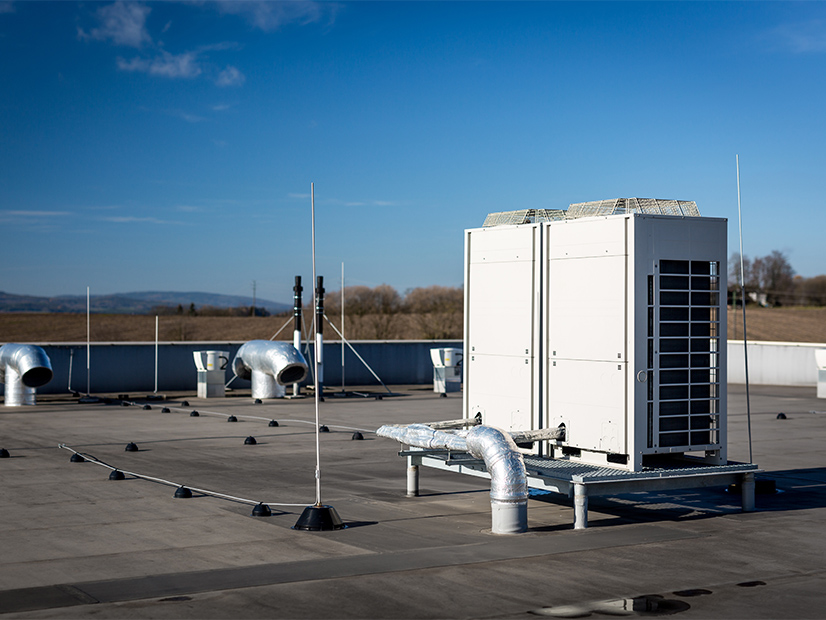The New Jersey Board of Public Utilities has released a $50 million-a-year, three-year plan to cut building carbon emissions by prioritizing a shift from delivered fossil fuels to electric heat pumps.
The proposal, which would work in conjunction with energy efficiency (EE) programs, outlines a series of possible building decarbonization (BD) start-up programs that target single and multifamily residential buildings as well as commercial buildings, placing a priority on low- and moderate-income customers.
The proposal arrives as state efforts to cut building emissions face resistance from the fossil fuel sector as well as business groups concerned about cost and whether the state will force building owners to make the transition.
The plan follows the strategy outlined in the state’s 2019 Energy Masterplan, which calls for buildings to be “decarbonized and largely electrified by 2050,” with fossil-fuel heating boilers and water heaters replaced by electric space heating and cooling systems and water heaters.
The decarbonization straw proposal is one of three plans in the second, three-year program cycle developed by the BPU, known as Triennium 2, to create energy efficiency and carbon emissions reduction programs as required by the New Jersey Clean Energy Act of 2018. (See NJ’s 3-year Energy Efficiency Plan Faces Scrutiny.) Another proposal released as part of Triennium 2 sets out the general goals and incentive mechanisms and a third part lays out demand response proposals.
“New Jersey’s ambitious greenhouse gas reduction goals require significant reductions in emissions from buildings on a rapid trajectory,” the proposal states. “This BD program is being launched as a first step towards large scale transformation in New Jersey’s buildings sector, while recognizing the likely market transformation that will result from federal EE and heat pump rebates.”
Working With Utilities
Joseph L. Fiordaliso, president of the BPU, called the proposal “an important step to work with utilities to measure and consider both energy savings and building emissions.”
The programs outlined in the proposal include:
-
- the “design, launch and test” of programs offered by utilities to target the installation of space and water heating appliances in the residential and multifamily sectors, with a priority on low- and moderate-income customers;
- a solicitation of programs to be offered by utilities to the commercial sector to encourage the switch to electric heat pumps, including proposals to encourage smaller commercial buildings to make the change, possibly incorporating district geothermal systems;
- the development of “programmatic infrastructure to effectively market, deliver and track BD program impacts and costs;”
- strategies to increase “market knowledge, infrastructure and capacity” to accelerate the shift to building decarbonization, and reduce the cost of pursuing it; and
- an effort to collect performance and “market transformation-related metrics” and prepare evaluation studies.
The BPU staff’s intent in compiling the program proposals was to “initiate programs of large enough scale in Triennium 2 to achieve some material economies, market adoption, and lessons learned, while managing the total cost to a target level that is well below that of EE programs,” the proposal states.
The state estimates the BD programs combined will cost $50 million a year for three years, allocating the funds to the state’s four utilities in relation to the portion of territory they serve.
Seeking ‘Climate Friendly’ Technologies
The release of the proposal follows Gov. Phil Murphy’s unveiling in February of a sweeping package of new clean energy initiatives that called for all electricity sold in the state to be clean energy by 2035, rather than the previous goal of 2050. The package also called for the state to install electric heating and cooling equipment in 400,000 homes and 20,000 commercial properties by 2030. (See NJ Governor Sets Out Accelerated Emissions Targets.)
In a separate initiative, Murphy created a Clean Buildings Working Group to study the issue. (See Murphy Outlines NJ Building Electrification Push.)
Commercial and industrial buildings emit 17% of the state’s greenhouse gases, well behind transportation (42%) and electricity generation (19%), according to the state’s National Electric Vehicle Infrastructure plan.
The shift to electricity has stoked resistance from business groups, which worry about the cost and express concern that the state will “mandate” a shift to electrical heating and hot water. They back a bill, S2671, that would prohibit any state agency from mandating the use of electric building energy systems until the release of a government report on the costs and benefits of electric heating.
So far, however, the bill has not advanced in either house. State officials say there is no such mandate, and they will drive the transition by persuading the public of the benefits of electric heating and water delivery and by offering incentives.
Fossil fuel interests say the state should explore alternatives before plunging into what they say will be a highly expensive bet on electricity. And the New Jersey Department of Environmental Protection backed off introducing a ban on new commercial-size fossil fuel boilers in a rules package enacted in January after opposition from business and fuel groups. (See NJ Backs off Ban on Commercial-size Fossil Fuel Boilers.)
Catherine Klinger, executive director of the Governor’s Office of Climate Action and the Green Economy, said the plan would “increase utility customers’ access to money-saving energy efficiency measures and climate-friendly heating and cooling technologies.”
“Comfortable building temperatures should not create emissions that contribute to the climate crisis,” she said. “Utilities will be asked to help educate customers about the benefits of home electrification and open up access to federal incentives that put money back into customers’ pockets when they adopt heat pumps.”

